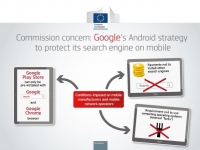Business
EC sends Statement of Objections to Google on Android operating system
Antitrust fight
The Commission's preliminary view is that Google has implemented a strategy on mobile devices to preserve and strengthen its dominance in general internet search. First, the practices mean that Google Search is pre-installed and set as the default, or exclusive, search service on most Android devices sold in Europe. Second, the practices appear to close off ways for rival search engines to access the market, via competing mobile browsers and operating systems. In addition, they also seem to harm consumers by stifling competition and restricting innovation in the wider mobile space.
The Commission's concerns are outlined in a Statement of Objections addressed to Google and its parent company, Alphabet. Sending a Statement of Objections does not prejudge the outcome of the investigation. Commissioner Margrethe Vestager, in charge of competition policy, said: "A competitive mobile internet sector is increasingly important for consumers and businesses in Europe. Based on our investigation thus far, we believe that Google's behavior denies consumers a wider choice of mobile apps and services and stands in the way of innovation by other players, in breach of EU antitrust rules. These rules apply to all companies active in Europe. Google now has the opportunity to reply to the Commission's concerns."
Smartphones and tablets account for more than half of global internet traffic, and are expected to account for even more in the future. About 80% of smart mobile devices in Europe and in the world run on Android, the mobile operating system developed by Google. Google licenses its Android mobile operating system to third party manufacturers of mobile devices.
The Commission opened proceedings in April 2015 concerning Google's conduct as regards the Android operating system and applications. At this stage, the Commission considers that Google is dominant in the markets for general internet search services, licensable smart mobile operating systems and app stores for the Android mobile operating system. Google generally holds market shares of more than 90% in each of these markets in the European Economic Area (EEA).
In his Statement of Objections, the Commission alleges that Google has breached EU antitrust rules by requiring manufacturers to pre-install Google Search and Google's Chrome browser and requiring them to set Google Search as default search service on their devices, as a condition to license certain Google proprietary apps; preventing manufacturers from selling smart mobile devices running on competing operating systems based on the Android open source code, and giving financial incentives to manufacturers and mobile network operators on condition that they exclusively pre-install Google Search on their devices.
The Commission believes that these business practices may lead to a further consolidation of the dominant position of Google Search in general internet search services. It is also concerned that these practices affect the ability of competing mobile browsers to compete with Google Chrome, and that they hinder the development of operating systems based on the Android open source code and the opportunities they would offer for the development of new apps and services. In the Commission's preliminary view, this conduct ultimately harms consumers because they are not given as wide a choice as possible and because it stifles innovation.
Liability for this article lies with the author, who also holds the copyright. Editorial content from USPA may be quoted on other websites as long as the quote comprises no more than 5% of the entire text, is marked as such and the source is named (via hyperlink).






